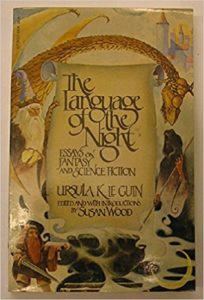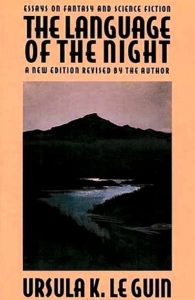

The use of imaginative fiction is to deepen your understanding of your world, and your fellow men, and your own feelings, and your destiny.
*
“It is a pure pleasure to turn to Ursula K. LeGuin, a writer who inhabits no one’s corral. The Language of the Night is a roundup of some of her most interning work—a collection of essays, critical and discursive, on the science fiction, writing, writers and life. Everyone who knows sf knows Ms. LeGuin; we all remember when we first read The Left Hand of Darkness and discovered a style as clear as sunlight and a moral sense as strong as reinforced concrete.

“I last encountered her in New Dimensions 9, in which she had recycled a historic sf cliche out of Fredric Brown’s ‘What Mad Universe’ into a reverberating love story called ‘The Pathways of Desire.’ In her still young career she has taught the most recalcitrant among us a bit about Taoism and Jungianism and art, and, offensive as she may find the notion, many of us think of her as the Mother of Us All.
All the pieces in The Language of the Night are valuable, pebbles made of lapis lazuli, but I treasure most her appreciations of J. R. R. Tolkien, James Tiptree Jr. and Philip K. Dick. These wildly varying writers are all in the sf/fantasy tradition, they are all fine and Ms. LeGuin presents them to us with pride and love.

“Finally, then, although there is not discernible change in the percentages—there is more good stuff now but also more bad—science fiction does have a future. We can trust people like Ms. LeGuin and Silverberg and Clarke, people who understand the past and may be precognitive as well.”
-Edna Stumpf, The Philadelphia Inquirer, August 26, 1979

